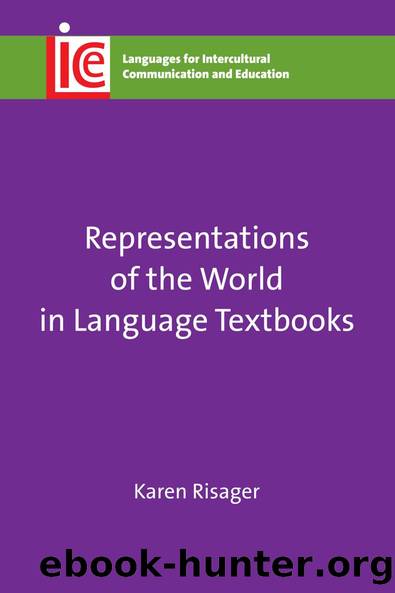Representations of the World in Language Textbooks by Karen Risager

Author:Karen Risager [Risager, Karen]
Language: eng
Format: epub
ISBN: 9781783099542
Google: ANeGswEACAAJ
Amazon: B078JD2YVH
Barnesnoble: B078JD2YVH
Goodreads: 44090409
Publisher: Multilingual Matters
Published: 2018-01-08T00:00:00+00:00
5Cultural Studies
Introduction
When we turn to a Cultural studies reading, we enter a field that is also interested in culture and politics, but with a methodological accentuation of process and agency, historicity and subjectivity, and with a much larger area of interest in terms of different kinds of identity.
Whereas the national culture reading puts a special focus on nations and national identity, and the citizenship education reading is particularly interested in cultural diversity in the sense of ethnic and linguistic diversity, Cultural studies includes these and other identity parameters such as gender, sexuality, race, class, caste, education, tribe, clan, religion, age, generation, lifestyle, etc. Some scholars emphasise studies of identities in which certain parameters intersect, for example: poor white males, black female academics, young Muslim women, etc.
In the Cultural studies tradition, âcultureâ is not seen as something that exists out there and can be described as norms and values, products and practices (an essentialist view). As the Cultural studies tradition accentuates process and agency, it favours a view of culture that presupposes that it is constructed in discourse (a non-essentialist view): Culture is not something that can be used to explain peopleâs norms and values, culture is what should be explained. For example, why does a specific discourse about âcultureâ exist in a certain context, and what does this discourse do? A similar distinction can be found in the study of identity: The focus is not on fixed identities as group memberships, but on processes of identification of self and Other: Who identify whom in space and time and with what effects? â not only in interactions between people, but also as part of large-scale cultural processes such as the unfolding of discourses in society about race, class, gender, age, nationality, religion, language, etc. A term that is sometimes used to cover this diversity is âinterculturalityâ, which in the Cultural studies context may be defined as discourses of the world that foreground diversity and encounters (Risager & Dervin, 2015).
Cultural Studies
Cultural studies began in Britain in the 1950s as an interest in the cultural practices of other groups than the ruling élite. The first important publication, The Uses of Literacy (Hoggart, 1957), shows how changes in the reading practices of the working class in postwar Britain affected individualsâ lives in many different respects in their work, family life, etc. Cultural studies was first institutionalised in the Centre for Contemporary Cultural Studies (CCCS) in Birmingham in 1964, founded by Richard Hoggart and Stuart Hall, and from there spread to the United States, Australia and many other places. It has developed into a very wide and differentiated field of study, but generally one can say that it focuses on the role of culture in contemporary society; on relations between culture, identity and politics; and on the forces of ideology and hegemony. It shows how the cultural practices of any group, organisation or institution are influenced by and in turn influence power relations.
A central figure in the field of Cultural studies is Stuart Hall (1992,
Download
This site does not store any files on its server. We only index and link to content provided by other sites. Please contact the content providers to delete copyright contents if any and email us, we'll remove relevant links or contents immediately.
The European Opportunity by Felipe Fernández-Armesto(569)
The European History Highway: A Guide to Internet Resources by Dennis A. Trinkle Scott A. Merriman(535)
Morgan Kaufmann Digital Watermarking and Steganography by Ingemar Cox Matthew Miller Jeffrey Bloom Jessica Fridrich Ton(528)
The Seven Wonders of the Ancient World by Michael Denis Higgins(520)
Hyperculture by Byung-Chul Han(509)
European Security in a Global Context by Thierry Tardy(505)
European Security without the Soviet Union by Stuart Croft Phil Williams(502)
The Routledge companion to Christian ethics by D. Stephen Long Rebekah L. Miles(498)
Get Real with Storytime by Julie Dietzel-Glair & Marianne Crandall Follis(443)
Hudud Al-'Alam 'The Regions of the World' - a Persian Geography 372 A.H. (982 AD) by V. V. Minorsky & C. E. Bosworth(436)
Gorbachev And His Generals by William C. Green(428)
Tibetan Studies in Comparative Perspective by Chih-yu Shih Yu-Wen Chen(427)
Governance, Growth and Global Leadership by Espen Moe(417)
How Languages Are Learned 5th Edition by Patsy M Lightbown;Nina Spada; & Nina Spada(406)
CliffsNotes on Fitzgerald's The Great Gatsby by Kate Maurer(399)
The Oxford History of the World by Fernández-Armesto Felipe;(388)
The Egyptian Economy, 1952-2000 by Khalid Ikram(379)
Oral Poetry and Narratives from Central Arabia: The Poetry of Ad-Dindan : A Bedouin Bard in Southern Najd (Studies in Arabic Literature, Vol 17) (English and Arabic Edition) by P. M. Kupershoek P. Marcel Kurpershoek(365)
The Oxford Handbook of the Incas by Sonia Alconini(364)
